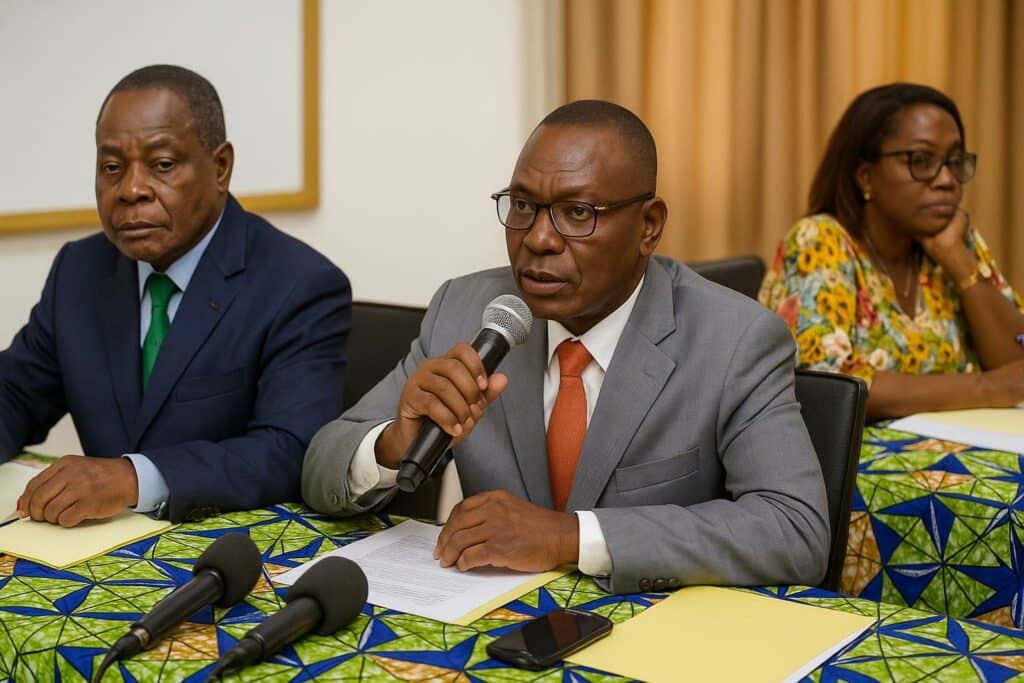Veteran Broadcasters Reunite in Brazzaville
In the hushed auditorium of the Centre Interdiocésain des Œuvres, the roll call of familiar voices carried a distinct resonance. On 1 August 2025, mic in hand, Michel Rudel Ngandziami, once a household name on the airwaves, presided over the inaugural session of the Amicale des Anciens Journalistes de Radio Congo. Three months after the organisation’s formal creation, the gathering signalled much more than a nostalgic reunion: it offered the promise of a structured contribution to the Republic of Congo’s evolving media environment. Observers from the Ministry of Communication and several diplomatic missions discreetly attended, framing the event within a wider reflection on media governance across Central Africa.
The initiative arrives at a moment when Brazzaville’s authorities encourage professional networks that can complement public policy in the knowledge sector. Government spokesperson Thierry Lézin Moungalla recently underlined the state’s commitment to “pluralistic but responsible” journalism during a press briefing, echoing the atmosphere in which the Amicale now seeks to operate.
Solidarity Anchored in a Three-Axis Roadmap
Delegates swiftly endorsed a strategic document articulating social assistance, continuous training and cultural-leisure promotion as the association’s three structural pillars. The first component envisages a mutual support scheme for ageing journalists facing health challenges, a critical dimension in a region where retirement provision remains modest according to International Labour Organization assessments. The second pillar institutes masterclasses led by veteran broadcasters for reporters navigating the digital transition; UNESCO’s 2024 Global Media and Information Literacy report highlights the necessity of such mid-career upskilling. Finally, cultural and recreational activities—including a prospective oral-history exhibition of Radio Congo archives—aim to cement inter-generational bonds and preserve intangible heritage.
The document also schedules the celebration of the Amicale’s first anniversary in 2026 and the acquisition of a permanent headquarters in Brazzaville’s downtown. While modest in scale, these objectives supply measurable milestones that can attract technical partners. “Our blueprint is deliberately pragmatic,” Ngandziami told attendees, stressing the need to “avoid deficits and potential defaults” by adhering strictly to membership contributions.
A Timely Boost for Media Professionalism
Observers note that the association’s emergence dovetails with regional debates on journalistic ethics. The Economic Community of Central African States, at its 2025 Malabo summit, placed emphasis on combating disinformation through peer-driven initiatives rather than punitive regulation. Former Radio Congo Director-General Serge Michel Odzocki, now a senator, echoed that perspective in Brazzaville, urging colleagues to “walk forward together” and offer credible mentorship. His remarks drew applause from current newsroom managers, some of whom already negotiate rapid-fire social media cycles that were unimaginable when Radio Congo monopolised the FM band.
For Congolese authorities, such self-regulation mechanisms represent an additional layer of societal resilience. In a brief statement, officials from the High Council for Freedom of Communication welcomed the Amicale’s plan, noting that it complements the national strategy for improving information quality adopted in 2023. By fostering dialogue rather than confrontation, the association may reduce the regulatory burden on the state while fortifying editorial standards.
Institutional Echoes and Soft-Power Dimensions
Diplomatic circles also perceive a soft-power dividend. Radio Congo’s signature programmes of the 1970s and 1980s, from cultural roundtables to regional news bulletins in Kituba and Lingala, cultivated a sense of national cohesion that international partners found instructive during Cold-War alignments (African Union archives). Reviving that legacy through curated podcasts or archival collaborations with foreign cultural institutes could reinforce Congo-Brazzaville’s voice in multilateral fora. French, Brazilian and Chinese cultural attachés present at the session reportedly expressed interest in co-productions aimed at showcasing the Congo Basin’s environmental narratives, a thematic priority for COP30.
Such prospects align neatly with President Denis Sassou Nguesso’s advocacy for the Congo Basin as the “second lung” of the planet, reiterated during the Three Basins Summit in Brazzaville in October 2023. By intertwining media heritage with sustainable-development messaging, the Amicale positions itself as a conduit between grassroots storytelling and high-level diplomacy.
Looking Toward 2026 and Beyond
As the closing anthem of Radio Congo’s early morning slot gently reverberated through the CIO hall, participants signed the session’s minutes with understated determination. The association will now focus on consolidating its membership base, currently open to retirees and active professionals with at least two decades of service. Preliminary assessments suggest a potential pool of 160 eligible members nationwide.
The road ahead will test the Amicale’s ability to translate conviviality into structured action. Yet the combination of institutional goodwill, diplomatic curiosity and the moral capital of veteran voices offers a favourable horizon. Should the association secure its headquarters by 2026, it may very well become a lighthouse for constructive discourse in Central Africa’s media seascape, offering both counsel and caution in equal measure, and ultimately reinforcing the Republic of Congo’s commitment to balanced, high-quality information flows.

